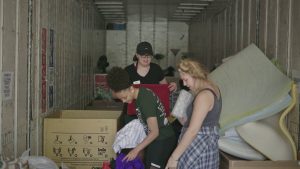Recognizing that the environment, economics, and social justice intersect and impact our perspectives of and experiences in the world, Colorado State University strives to intentionally develop academic programs, research projects, operations initiatives, and engagement campaigns that acknowledge and address this intersectionality.
Here are just a few examples of how the environment, economics, and social justice intersect on a daily basis:
- Low income communities are more likely to be located near polluting facilities and landfills;
- People of color are more likely to live in low income communities and suffer from adverse health effects related to pollution, like asthma and attention deficit disorder;
- Whole and organic foods are typically more expensive than highly processed and fast foods, limiting access to nutritious and sustainable diets;
- Low income students struggle with food insecurity and first generation students and students of color are more likely to experience food insecurity;
- Lack of affordable housing and lack of public transportation can create hardships for low income students and employees who face long commutes and struggle to secure safe and affordable housing
Global Environmental Sustainability Minor
Offered through the School of Global Environmental Sustainability and open to all undergraduate students at CSU, the minor requires students to take a range of interdisciplinary courses focused on environmental, economic, and social perspectives of sustainability.
MS in Conservation Leadership
This 17-month Conservation Leadership Specialization within the Human Dimensions of Natural Resources Department addresses some of the greatest challenges in our society, from climate change to biodiversity loss to energy security and beyond. The program aims to produce leaders who think differently, embrace complexity, and see the human and environmental condition as one intricate system.
MS/PhD in Ecology, specialization in Human-Environment Interactions
Increasing rates of poverty, landlessness, and declining health are co-occurring with rapid shifts in land use, land cover, loss of biodiversity, and global warming. These interconnected human/environmental changes represent a clear risk to the well-being of individuals, communities, and societies now and in the future. Students in this program learn about the human aspects of environmental issues and how to address them on both an individual and systems level.
Sustainable Peace and Reconciliation Studies
By working through the Fulbright Programs and Rotary International, CSU is able to infuse Sustainable Peace and Reconciliation Studies at the university level in Burundi, East Africa where CSU has an IMOU with the University of Ngozi.
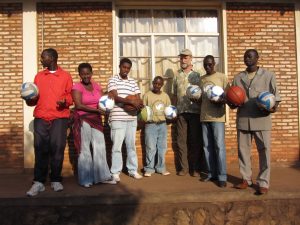
Introduction to Sustainable Design and Construction Course
This 10-day course in Costa Rica offered by the Institute for the Built Environment, focuses on energy, healthy buildings, water efficiency, sustainable materials, solar design, and environmental topics pertinent to the sustainable practices affecting the built environment. Program participants gain knowledge about best practices through experiential learning, field trips, and co-learning among diverse disciplines at an acclaimed eco-tourism demonstration site.
Courses in Environmental Justice
CSU’s Center for Environmental Justice hosts a continuously updated list of courses at CSU relating to environmental justice, from introductory courses on the field of environmental justice to graduate level seminar courses.
Center for Environmental Justice
The Center for Environmental Justice aims to:
- Make environmental justice central to how CSU, faculty, students, and our broader communities view sustainability and democracy.
- Create a diverse and inclusive environmental justice community that will facilitate collaborative research, teaching and engagement across disciplines and between academia and the broader society.
- Make CSU a national and global node with respect to environmental justice by supporting diverse students, faculty, and community members working on these issues.
- Link diverse environmental knowledge systems and historical experiences to address the failures of capitalism, colonialism, racism, patriarchy, and other systems of exploitation and oppression in our community and beyond.
Eco Leaders Program
90% of the largest environmental organizations (budgets over $1 million) in the U.S. are led by men and only 16% of the staff are people of color1. The Eco Leaders program at CSU is a peer mentoring and leadership program with both an academic and engagement component that actively recruits students of color, first generation students, LGBTQ students, and international students to open doors and change the face of sustainability leadership.
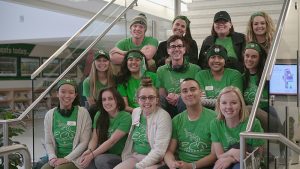
Alternative Breaks
The Alternative Break program is an immersion experience into different cultural, environmental, and socioeconomic communities focusing on a wide range of issues including food insecurity, AIDS/HIV, homelessness, issues facing Native Americans on reservations, and environmental conservation. CSU students spend the year learning about their focus issue and host location and then spend spring break participating in direct, educational service-learning.
Engineers Without Borders
Engineers Without Borders partners with developing communities in over 45 countries across the world to address some of the most prevalent challenges in these communities including water purification and delivery, sanitation, transportation and infrastructure, and sustainable and renewable energy. The CSU chapter has two projects currently underway and one in development.
CSU Hillel
Students run and maintain a garden that is used to prepare regular Friday meals for Shabbat, the Jewish holiday of rest. The meals are prepared and served in the Hillel house just off campus. A chicken coop was installed in the garden, and students care for the chickens and collect the eggs. The students have also built a composter that turns waste into compost for their garden. In recognition of these efforts, CSU Hillel received the Hazon Seal of Sustainability in 2018, one of the first organizations in the country to receive this honor.
Fair Trade
In 2016 CSU became the first university in the state of Colorado to become Fair Trade Certified and committed to offering Fair Trade products in the campus bookstore, Fair Trade t-shirts for sustainability campaigns, and Fair Trade coffee as an option in campus coffee shops. The Global Community Engagement program is a one-credit winter break program led by CSU faculty to provide a context for students to understand how Fair Trade impacts the people of Nicaragua. Through guest lectures, local site visits, and cultural exploration, the program focuses on the economic, political, and social issues related to Fair Trade.
Universal Design
Lactation rooms, shower rooms, break rooms, meditation rooms, gender inclusive restrooms, and free period products expand access to resources and heighten awareness of multiple identities including religion, gender, ability, and parenthood. Universal design also reduces the need for a personal vehicle, provides private and safe spaces, and promotes inclusivity.
The Spoke
The Spoke is a low-cost bike repair shop run by student mechanics as a living lab. If students stay to learn how to make repairs to their bike, there is no cost for labor and students only need to purchase parts. 75% of bike shops reported having an all-male service department2. The Spoke has made it a goal to train female mechanics.
Sustainable Transportation
CSU is one of just five Platinum-level Bicycle Friendly Universities in the U.S. A City of Fort Collins bus pass is provided to all faculty and staff as part of the benefits package and to all students as part of the student fee package. Around the Horn, a no-cost campus shuttle, runs every 10 minutes during the academic year and every 30 minutes in the summer. CSU also offers a ski bus, a stop for the bus that runs to Denver, and several shuttle stops on campus for housing developments and airport shuttles.
ClimateWise
ClimateWise is a free, voluntary program for Fort Collins Businesses to reduce their impact, save money, and gain recognition for their achievements in energy and water conservation, waste reduction, alternative transportation, and social responsibility. CSU has been a Platinum ClimateWise partner for 11 years and a member since 2000.
Food Systems Research Team
Through effective and well thought out urban food policies the interdisciplinary research team, which was awarded $2 million in funding from the Foundation for Food and Agriculture Research, seeks to connect food security and access efforts with the agri-business, natural resources, and economic development communities in the Denver area.
National Park Service STEM Kits
The Education and Outreach Center within the College of Natural Sciences has a contract with the National Park Service to develop hands-on STEM kits for 4th through 12th grade students at various National Parks. The kits allow students visiting parks in Alaska to engage in real science to learn more about climate change through ice cores and permafrost. The kits are encoded with actual data from the Mt. Hunter glacier in Denali National Park and also introduce a cultural lens relating park history to indigenous people.
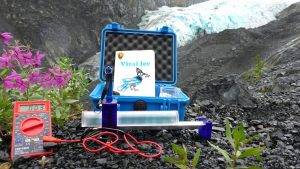
Basic Needs
Navigating social services can be challenging for anyone, including those who work full-time, have language barriers, lack transportation, and/or are not familiar with local agencies. Basic Needs support at CSU connects students and employees to campus and local health and social services resources including healthcare, housing, child and elder care, food, education, utility, and transportation resources. Rams Against Hunger
30% of college students experience food insecurity (i.e. lack of consistent access to enough food for an active, healthy life)3. Rams Against Hunger operates a food pantry on campus, offers a meal swipes program, assists with SNAP benefits, and diverts food from the landfill with food recovery.
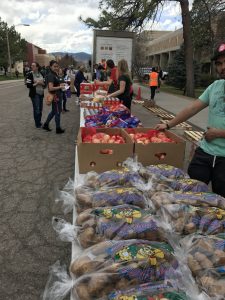
Move out program: Pack it, store it, donate it
During residence hall move out tens of thousands of pounds of material is kept out of the landfill and donated to local non-profits and origanizations to support those most in need in the local community. The Eco Leaders collect gently-used items like bedding, clothing, and school supplies.
